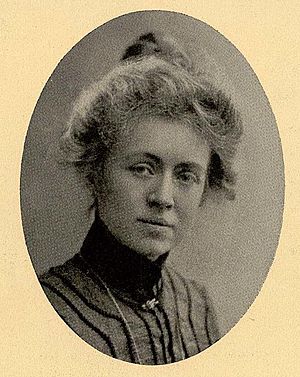Frida Stéenhoff facts for kids
Helga Frideborg "Frida" Maria Stéenhoff (born December 11, 1865, in Stockholm – died June 22, 1945, in Stockholm) was a Swedish writer and a strong supporter of women's rights. She was a key person in public discussions about making sure men and women were treated equally. She wrote for several new and progressive publications. Frida was also involved in the movement that fought for women's right to vote and helped many groups that worked to help people.
During World War II, she worked against fascism, which is a type of government where one leader has total power and often controls people's lives. Frida Stéenhoff became well-known, and sometimes caused debate, with her first novel, Lejonets unge (which means Lion's Child). She is also known for introducing the modern idea of feminism in Sweden with her book Feminismens moral (Feminist Morality) in 1903. Feminism is the belief that women should have the same rights and opportunities as men.
Frida Stéenhoff sometimes used a male pen name, Harald Gate, to write her works. She also wrote for a feminist magazine called Tidevarvet.
Frida Stéenhoff was the daughter of Carl Bernhard Philonegros Wadström and Helga Westdahl. Her sister, Ellen Hagen, was also a writer and worked for women's right to vote. In 1887, Frida married a doctor named Gotthilf Stéenhoff.
Contents
What Did Frida Stéenhoff Do?
Frida Stéenhoff was a very active person who believed strongly in fairness and equality. She used her writing to share her ideas and encourage people to think about important social issues. She was especially passionate about women's rights and making sure women had a voice in society.
Her work helped to change how people thought about gender roles and encouraged more discussions about equality in Sweden. She wasn't afraid to talk about new or even controversial ideas for her time.
Her Important Ideas and Writings
Frida Stéenhoff wrote many books and plays that explored themes of freedom, equality, and the roles of men and women in society. Her book Feminismens moral was very important because it helped people understand what feminism meant and why it was important for women to have equal rights.
She often wrote about how society's rules affected women's lives and argued for more freedom and independence for them. By using a male pen name, Harald Gate, she might have wanted to see if her ideas would be taken more seriously when people thought a man had written them. This also showed how different people were treated based on their gender.
List of Her Works
Frida Stéenhoff wrote many different types of works, including novels and plays. Here are some of her most well-known pieces:
Novels and Serials
- 1902 - Det heliga arvet (The Holy Inheritance)
- 1904 - Öknen (The Desert)
- 1911 - Kring den heliga elden (Around the Holy Fire)
- 1915 - Ljusa bragder och mörka dåd (Bright Deeds and Dark Acts)
- 1918 - Filippas öden (Filippa's Fates)
- 1937 - Objektiv stats- och könsmoral (Objective State and Gender Morality)
Plays
- 1896 - Lejonets unge (Lion's Child)
- 1898 - Sin nästas hustru (His Neighbor's Wife)
- 1900 - Ärkefienden (The Arch-Enemy)
- 1907 - Stridbar ungdom (Combative Youth)
- 1908 - Den vita duvans samfund (The White Dove Society)
- 1910 - Den smala vägen (The Narrow Path)
- 1911 - Kärlekens rival (Love's Rival)
See also
 In Spanish: Frida Stéenhoff para niños
In Spanish: Frida Stéenhoff para niños


